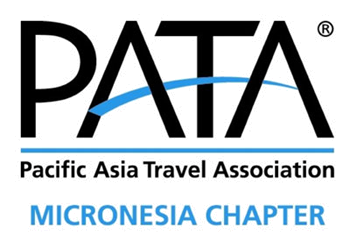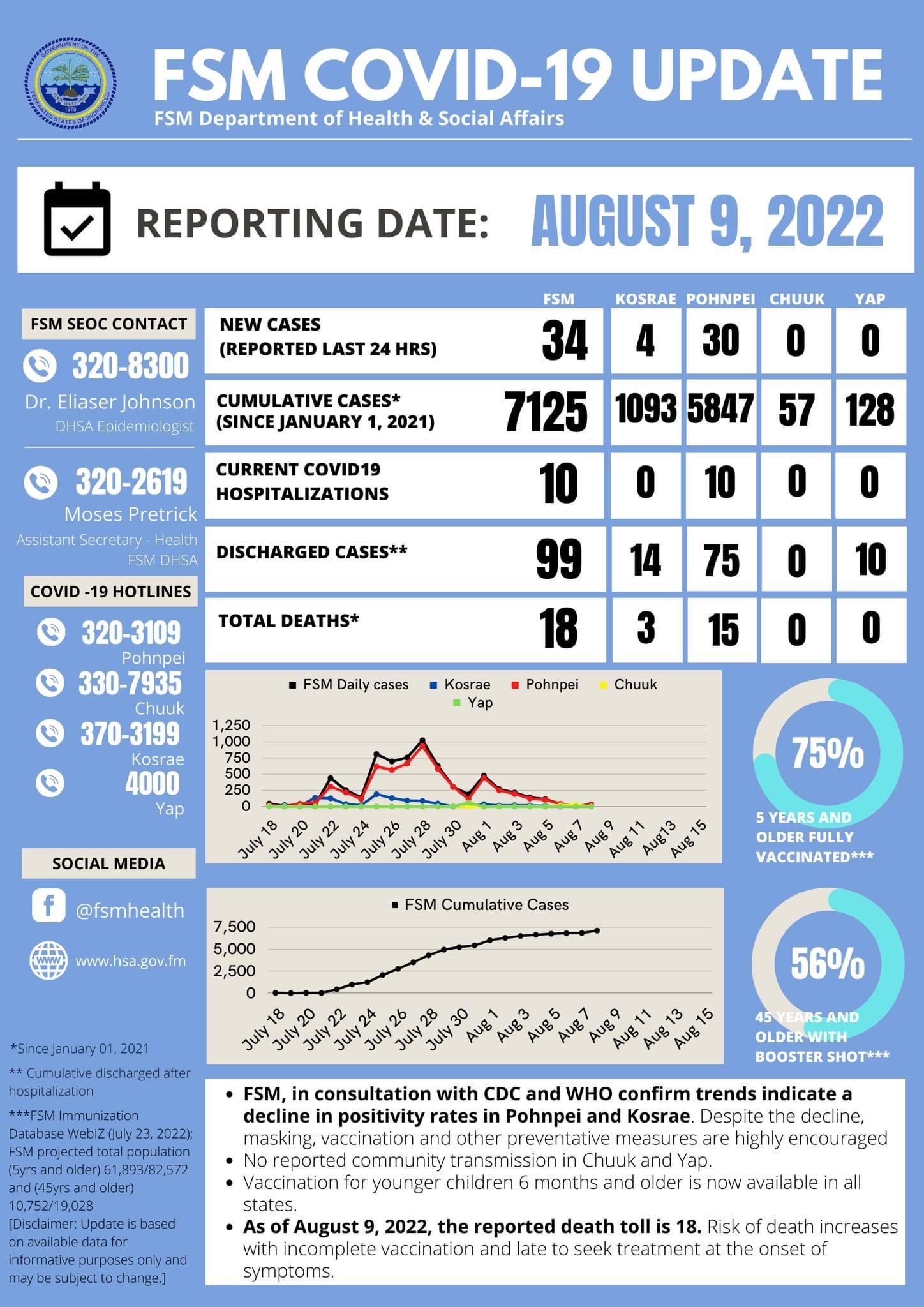FSM COVID-19 Update
Date: August 9, 2022
https://www.facebook.com/piofsm

Date: June 7, 2022
PACIFIC UNITY STRENGTHENED & SOLIDIFIED
Micronesia to Remain in Pacific Islands Forum; Subregional Rotation to Begin in 2024
-----
Micronesian Presidents Summit Joint Release
-----
SUVA, Fiji—On June 6th to 7th, 2022, the Leaders of the Micronesian Presidents Summit, represented by H.E. David W. Panuelo of the Federated States of Micronesia, H.E. Surangel S. Whipps Jr. of the Republic of Palau, and T.H. John Silk, Special Envoy of the Republic of the Marshall Islands, convened in person in order to engage in a High-Level Political Dialogue with the leadership of the Pacific Islands Forum. It is the view of the Micronesian Presidents Summit that the High-Level Political Dialogue has resulted in a reform package that succeeds at its goals of strengthening the Pacific Islands Forum as an organization, appealing to the Micronesian Presidents Summit’s pleas for equity, and bolstering the Pacific’s unity and solidarity.
The High-Level Dialogue was established in order to address and resolve major reform issues concerning the impasse that resulted in the imminent withdrawal by the Micronesian Presidents’ Summit, to explore and discuss needed genuine political reforms within the Forum, and as a demonstration of respect for the shared bonds as Pacific Islanders, the collective desire for a constructive dialogue on substantive leadership and political reforms to avoid the disintegration of the Forum membership, and a collective recognition that a united Pacific represents the region’s best chances at maintaining peace (and preventing war), developing prosperity (and preventing hardship), and mitigating and adapting to Climate Change (and preventing civilizational collapse).
As a demonstration of leadership and brotherhood, the Chair of the Pacific Islands Forum offered a reform package for consideration by the Micronesian Presidents Summit. The proposed package in its original form showed recognition and appreciation for the perspective of the Micronesian Presidents Summit as originally stated in the Mekreos Communique. Following candid and genuinely friendly discussions on the basis of good faith, mutual trust and respect, and Pacific solidarity, the proposed reform package has been approved by the Micronesian Presidents’ Summit.
The reform package includes that all members of the Pacific Islands Forum agree that equal representation of the three sub-regional bodies of Micronesia, Polynesia, and Melanesia, is essential; as such, there shall be two Deputy Secretary-General positions, each hailing from a separate sub-region as the Secretary-General.
The reform package further includes that all members of the Pacific Islands Forum agree to rotate both the Secretary-General and the Forum Chair by sub-region, with Micronesia to hold the next Secretary-General position beginning in 2024 for a term of five-years.
There is agreement to create, and immediately install, a Pacific Ocean Commissioner as a role separate and distinct from the duties of the Secretary-General. The office of the Pacific Ocean Commissioner shall be based in Micronesia, the term of the Pacific Ocean Commissioner shall last three years, and the Commissioner shall report directly to the Leaders.
There is further agreement that a Pacific Islands Forum sub-regional office shall be created in the Micronesia sub-region.
After all members of the Pacific Islands Forum sign their agreement to the reform package, it takes effect immediately.
It is agreed that, on the basis of good faith and approval of the reform package by the end of June 2022, each Micronesian country shall rescind its withdrawal from the Pacific Islands Forum.
The Micronesian Leaders strongly felt that the solidarity and integrity of the PIF was strengthened by the Gentlemen's Agreement and should not be ignored. The principles of the Gentlemen’s Agreement are now concretized and solidified, with the result being a stronger Pacific Island Forum and a stronger Pacific.
Nations Promise Billions For Sustainable Oceans At Palau Conference
Date: April 13, 2022
Nations and philanthropic organizations pledged to redouble their efforts to conserve the world’s oceans this week at the seventh Our Ocean conference in Palau.
The conference spanned two days of speeches, panels and sessions about sustainable fisheries, Indigenous community-led conservation and other topics related to oceans.
Leaders and representatives of nonprofit groups made promises to better address climate change and related issues as advocates pressed for more urgent action.
On Wednesday in Palau, the European Union promised to back 44 ocean-related commitments worth more than $1 billion. The U.S. government announced over 100 commitments worth $2.7 billion, including 16 new sustainable fisheries initiatives worth at least $120 million and a new tool for assessing marine-protected areas.
“We are past negotiating for commitments. It’s time we act on those commitments that we have made,” Palau President Surangel S. Whipps, Jr. said in his opening remarks.
The conference came five months after nations gathered in the United Kingdom for the United Nations climate change conference known as COP26. The conference resulted in a promise to reduce the use of coal, but critics have lamented how the promises made aren’t enough to prevent the world’s temperature from continuing to rise by at least 1.5 degrees Celsius.
The Palau conference this week was another opportunity for world leaders to address issues like shipping industry emissions, marine pollution and rising seas.
U.S. climate envoy John Kerry said Russia’s war on Ukraine underscores the importance of moving toward reliance on clean energy. Russian President Vladimir Putin “cannot control the power of the wind and the sun,” Kerry said.
Europe is heavily dependent on Russia to provide gas, which has complicated Western efforts to impose sanctions on Moscow.
Kerry noted that this week’s conference in Palau was the first since 2014, and the first to be held in a small island nation. In previous years, the conference resulted in more than 1,400 individual commitments worth more than $90 billion and protections for over 5 million square miles of ocean.
“We gather here in the Pacific, the frontlines of the crisis both in our oceans and on our planet,” Kerry said. “We need the full-throated voice of the island states particularly because you speak with a particular moral imperative, with a particular capacity to be persuasive.”
Kerry said 20 countries are responsible for 80% of emissions on the planet and acknowledged the U.S. is the second-largest carbon emitter. He added the U.S. is working with the shipping industry to eliminate carbon emissions in that industry by 2050.
New Zealand announced a $3 million commitment to support the University of the South Pacific and University of Canterbury to produce a Pacific Ocean climate crisis assessment. Ireland announced a new $2.2 million euro research program on blue carbon storage and sequestration. Indonesia promised to expand its marine-protected areas.
Nongovernmental organizations also made pledges. The Green Climate Fund announced a funding agreement with Pegasus Capital Advisors worth $125 million of investments to support sustainable oceans. The fund also announced four new coral reef initiatives that would unlock another $120 million, including initiatives in Palau, the Federated States of Micronesia and the Marshall Islands.
Many speakers acknowledged the role that Indigenous communities play in conservation and sustainability and spoke of the particular challenges faced by island nations facing rising sea levels and threats to their traditional fishing practices.
On Thursday in Palau, Keone Nakoa, representing the U.S. Department of the Interior, said the Biden administration values Indigenous knowledge in addressing climate change, and described Hawaii’s Papahanaumokuakea Marine National Monument as a premiere example of Indigenous co-stewardship of oceans.
The vast expanse is co-managed by the Office of Hawaiian Affairs, not just state and federal agencies, and Nakoa noted the area is a space where Native Hawaiians may sail using traditional navigational methods learned from Micronesian navigator Mau Piailug.
Next year’s conference is scheduled to be held in Panama. Click here to watch Day One of the conference here to watch Day Two and learn more about the speakers.
Civil Beat’s coverage of climate change is supported by the Environmental Funders Group of the Hawaii Community Foundation, Marisla Fund of the Hawaii Community Foundation and the Frost Family Foundation.








